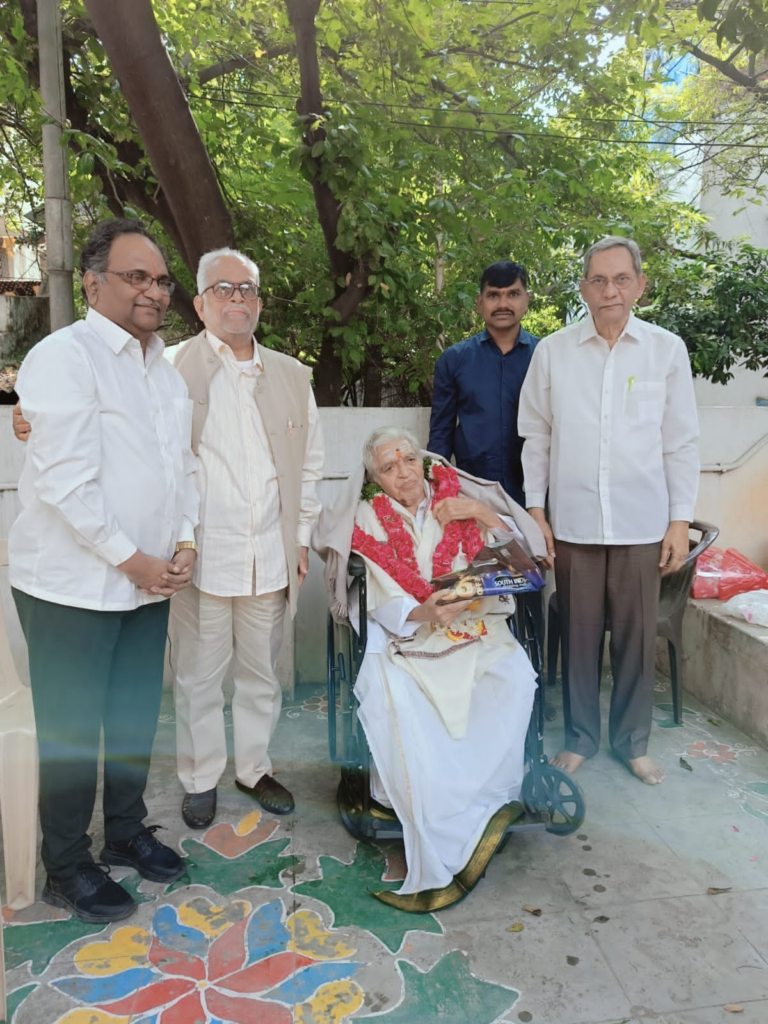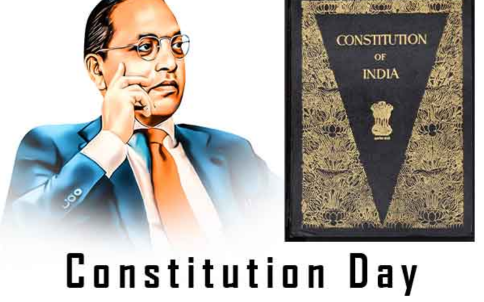Professor M Sridhar Acharyulu
Most people understand the objectives of the Preamble, but it needs to be explained the word ‘dignity’. Recently Mr. Chukka Ramaiah (born 20 November 1925) an educationist famously known as “IIT Ramaiah”, his fans celebrated his 99th year. He established a reputation among generations of engineers as his student.

(This writer, Justice Sudarshan Reddy, Ramaiah, his disciple, Ramachandra Murthy)
One of the personalities who visited Ramaiah is Justice Sudarshan Reddy, former Supreme Court. Famous editor K Ramachandra Murthy, of www.primepost.in and www.sakalam.in websites was also there. Justice B. Sudarshan Reddy (born 8 July 1946) was the first Lokayukta of Goa. He also served as Legal Advisor of Osmania University. On 2 May 1993, Reddy became an additional Judge of the Andhra Pradesh High Court. He was appointed Chief Justice of the Guwahati High Court on 5 December 2005. Justice Reddy was elevated to the post of additional Judge of the Supreme Court of India on 12 January 2007 and retired on 8 July 2011 from the post. India Today published this paragraph about him.

Justice Reddy said that people talk about many objectives but emphasize ‘dignity’. The people ignore this important point. The PMs and CM’s manifestoes promise food, shelter, and clothing. Are the three promises enough? What about dignity? It is a very provoking point raised by Justice Reddy! We call the 74th Constitution Day. We celebrate the Constitution Day, also called National Law Day. It was 75 years back it happened. Though we became independent in 1947, the nation prepared this Constitution and commenced it in 1950. But the significant part of the Constitution of India commenced on 26th November 1949, two months before the Republic Day on 26th January 1950, including the right to vote. Interestingly the right to vote was ‘given’ the first two months before the commencement of the Constitution. But the right to life was recognized (not ‘given’) on Republic Day, so the right to vote is the ‘right to speech’ which is part of the expression. It is a fundamental right, without young students remembering it. Generally, Constitutional experts appreciate every phrase in the Preamble as specially selected by the framers of the Constitution of India, especially BR Ambedkar. It is based on the ideals behind the Preamble laid down by Jawaharlal Nehru’s Objectives Resolution, adopted by the Constituent Assembly on January 22, 1947. Although not enforceable in court, the Preamble states the objectives help aid during the interpretation of Articles when language is found ambiguous.
The most important point is the Fraternity along with the word “dignity”. Ordinarily, it is referred to as ‘Fraternity’ means a feeling of brotherhood and an emotional attachment to the country and all the people. However, the fraternity helps to promote dignity and unity in the nation. We need to emphasize ‘dignity. That provides a way of life. It includes fraternity, liberty, and equality as the notion of a happy life that cannot be taken from each other.
Liberty cannot be divorced from equality, equality cannot be divorced from liberty. Nor can liberty and equality be divorced from fraternity. Without equality, liberty would produce the supremacy of the few over the many. · Equality without liberty would kill individual initiative. · Without fraternity, liberty would produce the supremacy of the few over the many. Without fraternity, liberty, and equality could not become a natural course of things. Dignity means that every person has the inalienable right to live a dignified life without discrimination. The right to live with human dignity is one of the fundamental rights guaranteed under Article 21. They are entitled to claim equal respect from the state as well as from other persons. In Maneka Gandhi v. Union of India, the Supreme Court gave a new dimension to Art. 21. The Court held that the right to live is not merely a physical right, but includes within its ambit the right to live with human dignity.
With decisions on Aadhaar, IPC 377, and the right to privacy, the Supreme Court has reaffirmed the centrality of human dignity to the Constitution. The concept was invoked 120 times in the privacy decision, and 128 times in Navtej Johar case. Despite the enthusiasm of the courts, there is growing scepticism about the application of dignity. Justice Kennedy, writing for the Court, described the “stigma” of the Texas sodomy statute: “Still, it remains a criminal offense with all that imports for the dignity of the person charged.” (Lawrence, 539 U.S. at 575. NEBRASKA LAW REVIEW page 742) Author Neomi Rao, “Three Concepts of Dignity in Constitutional Law”, (86 Notre Dame L. Rev. 183 (2013) explained: “The U.S. Supreme Court and constitutional courts around the world regularly use the term human dignity when deciding cases about freedom of speech, reproductive rights, racial equality, gay marriage, and bioethics. Judges and scholars treat dignity as an important legal value, but they usually do not explain what it means and often imply that it has one obvious core meaning. A close review of constitutional decisions, however, demonstrates that courts do not have a singular conception of dignity, but rather different conceptions based on how they balance individual rights with the demands of social policy and community values. Using the insights of political theory and philosophy, this Article identifies three concepts of dignity used by constitutional courts and demonstrates how these concepts are fundamentally different in ways that matter for constitutional law. In contentious cases, the concepts of dignity will often conflict. If constitutional courts continue to rely on human dignity, judges must choose between different understandings of dignity”. Rao wrote this Article to provide the groundwork for making these choices and defending a concept of dignity consistent with American constitutional traditions. Though the politicians expecting to win power as Prime Ministers or Chief Ministers, as MPs or MLAs, may spend money on food, shelter, and cloth, in the name of subsidies with manifestoes and attractive schemes, they still get defeated. Why? Because when the people felt insulted, their ‘dignity’ is violated.





